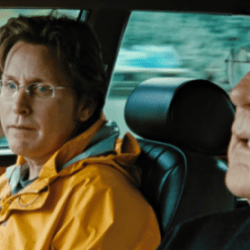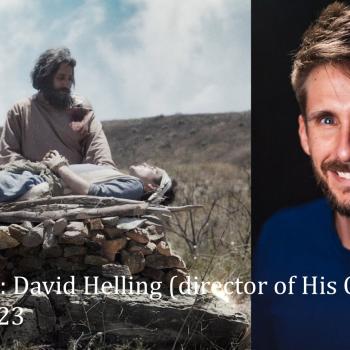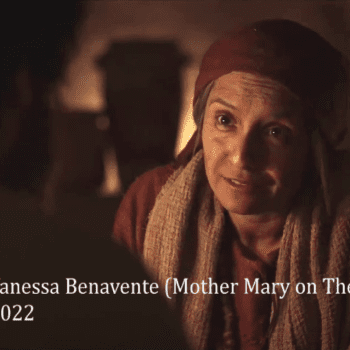
The Bedford Today, via FilmStew.com, reports that a couple of filmmakers have launched a website to raise money for Sir Richard Attenborough‘s dream project on American revolutionary Thomas Paine. A script for the film, titled These Are the Times, has already been written by Trevor Griffiths, and Neil Fox and Justin Doherty hope to raise £40 million, or about $78 million, to produce the film through their website A Gift for Dickie.
Reading this story brings back memories for me, because I interviewed Sir Richard nine years ago while he was promoting Grey Owl (1999), a biopic starring Pierce Brosnan as an Englishman who lived in Canada and pretended to be a Native American. Curiously, I did not remember anything that Sir Richard said about Grey Owl itself until I dug up my article on him, which originally ran in the Vancouver Courier and which I am reprinting below. But reading it now, I can suddenly remember his voice and how theatrical he became when he said things like, “He moves like a panther…”
What I have remembered all these years is what Sir Richard said about his dream of making a Thomas Paine film. Curiously, I see that I quoted almost none of that material in the story below. But two things stand out in my memory.
First, when he discussed how difficult it was to get a feature-film sized budget for the movie, I suggested that maybe he would have better luck producing it as a TV mini-series. Sir Richard looked at me, and said in a voice full of grace and humour and self-deprecation, “You’re very wise, but…” I believe his answer had something to do with his desire to give his film the sort of epic scale that only a widescreen movie can have. But what I remember is the way he said, “You’re very wise…”
Second, as he was describing Paine’s life story, he got particularly enthusiastic when he mentioned the “two fabulous affairs” that Paine had had. I kind of winced, kind of smiled when he said it, because one of my chief criticisms of Sir Richard’s films — as per my capsule review of Grey Owl, which is also reprinted below — is that he has an unfortunate tendency to reduce his biographical subjects to cheesy, soppy romances. And here he was, doing it again, placing the greatest possible emphasis on how “fabulous” Paine’s love life was.
I hope I still have the tape of that interview somewhere; I have moved several times in the past nine years and I now record my interviews digitally, so I haven’t really had a reason to dig the tapes out of whatever box they’re in. I’m sure this would be a fun one to listen to again; just now, another memory popped into my head, of Sir Richard explaining that, after a 14-year break from acting so that he could focus exclusively on directing, he agreed to step in front of a camera again, for Steven Spielberg’s Jurassic Park (1993), because Spielberg has “the charm of the devil.” It would be fun to hear soundbites like that again, and to see how close they come to my memory of them.
Incidentally, not too long after I did the interview, I went with my parents to the Cinematheque to see a couple of old films produced by Noel Coward and directed by David Lean — and one of them, In Which We Serve (1942), features the future Sir Richard in a tiny, uncredited part as a sailor who deserts his post. It was so strange, to think that I had met this actor recently, and here he was, as a much, much younger man on the big screen in a movie that was made before either of my parents had even been born.
Anyway, until and unless I find that interview tape, the articles I wrote will have to suffice. And here they are:
– – –
By Peter T. Chattaway
Lord Richard Attenborough got his start as an actor, appearing in films such as The Great Escape and Doctor Dolittle, but over the past couple of decades he has achieved his greatest fame as an Oscar-winning director. Most of his films — including Gandhi, Chaplin, Cry Freedom (about anti-apartheid activist Steven Biko), Shadowlands (about C.S. Lewis), and In Love and War (about Ernest Hemingway) — are biographical in nature, and his latest film, Grey Owl, is no exception.
Grey Owl stars Pierce Brosnan as Archie Belaney, an Englishman who grew up with romantic notions of becoming a Native American and, after he moved to Canada, began to go by the name “Grey Owl” and convinced people that he had been born in Mexico to an Apache mother and a Scottish father. Belaney could have lived the rest of his life in obscurity, but he enjoyed writing about the outdoors, and in the 1930s, he became one of the first internationally famous conservationists.
Attenborough remembers standing in a line for five hours with his brother David, now a famous naturalist in his own right, to hear Grey Owl speak during his tour of England in 1936. But it wasn’t until Attenborough’s partner, Diana Hawkins, came across a magazine article on Grey Owl eight years ago that he thought about turning the man’s mysterious story into a feature film.
“It was irresistible,” says Attenborough, who spent the past few weeks criss-crossing Canada to promote the film. “I mean, the story had everything. It’s an adventure, it’s a love story, it’s in Canada — a country that hasn’t been cinematically overworked, as it were — it’s exciting, it’s touching, it’s moving, and it has something to say about the planet. But above all, it’s the story of a guy who wasn’t the guy he said he was. And so it became a wonderful shape and dramatic line for a story, with so many elements going at the same time.”
Like a number of Attenborough’s more recent films, Grey Owl spends much of its time on a love story, in this case between Belaney and Gertrude “Pony” Bernard (Annie Gallipeau), a Native woman who wants to get back to her roots. In real life, there were numerous difficulties in their relationship, and she did not learn her husband’s true identity until the rest of the world learned it after his death in 1938, but in the film, Belaney comes clean and all is forgiven.
“That’s the cheat in the movie,” Attenborough admits. “In the movie, you needed the climax, you couldn’t tell the love story with a deception in it, then have him die and then slot a little bit at the end where she discovers the truth. We were very much persuaded by the writer, Bill Nicholson, that this was essential, and I think he was right. So we’ve contained his confession within this story. And that’s basically the only cheat that we’ve made.
“I mean, we have been and will be accused of romanticizing it. I don’t know whether we’ve romanticized it or not. I suppose we have, to the extent that we have excluded things which didn’t fall within the two-and-a-half year period of this story, because we had decided we would tell the love story. His real bash on the booze was after she’d gone, and in the last 18 months to two years of his life, part of which was in England, when he really got sloshed.”
Attenborough wanted Pierce Brosnan for the role from the start, but investors didn’t consider the Irish actor bankable until after Tomorrow Never Dies, the second James Bond, came out. Ironically, the British superspy that most people now associate with Brosnan is a paragon of the sort of wasteful consumption that Grey Owl detested — things are always blowing up in James Bond movies, and the marketing around those films is replete with product placements.
But Attenborough says he wasn’t bothered by all that baggage, and he’s convinced Brosnan was able to shed himself of that other persona. He also says Brosnan, apart from being very charismatic, was key to the film’s success because he’s unusually physical for an actor from that side of the Atlantic.
“Our star actors are not physical actors. Olivier was, but Richardson, Redgrave, Guinness, they’re not physical actors. None of them could have played this part. This man is a wonderful, physical actor. He moves like a panther, he runs marvelously, and he deals with whatever physical things have to be dealt with, with enormous conviction.
“We shipped a canoe out to L.A., and we found a guy who knew absolutely how Grey Owl paddled this particular canoe in period terms and so on, and Pierce rehearsed and learnt how to do it. He learnt how to do the snowshoes, which is a considerable skill. He’s marvelous with a rifle; you just absolutely believe that it’s part of his daily routine. And he works at it.”
In addition to being a knight and, as of 1994, a member of the House of Lords, Attenborough is keeping busy with several other film projects that are in development at the moment, including an NBC mini-series on the Old Testament and biopics on Jean-Paul Sartre and Thomas Paine, the latter of which he calls “the picture that I want to do above all others.”
So far, no one has asked him to reprise his role as John Hammond in the third Jurassic Park movie, but he says he’d be willing to do it. “It’s rather amazing, actually, that at the age of 76, A: I’ve got the strength and B: people think I’ve got the strength to go on working,” he says with a hearty chuckle. One day they may have to make a movie about him.
– – –
Grey Owl — 2.5 stars out of 5
by Peter T. Chattaway
Richard Attenborough is best known as the director of Gandhi and Cry Freedom, two consciousness-raising films about social injustice that came out in the 1980s. The films he has produced since then, however — including biopics on Charlie Chaplin (Chaplin), C.S. Lewis (Shadowlands) and Ernest Hemingway (In Love and War) — have followed a disappointing pattern. All of these flicks have tended to downplay the very things that made their protagonists most interesting, and have focused instead on their somewhat more banal love lives.
Grey Owl, with its pro-environment save-the-beavers message, is obviously meant to be a return of sorts to the politically conscious films of yore. But, like Attenborough’s more recent efforts, it tells us precious little about its ostensible subject and spends too much time on a poorly-written romance between Grey Owl (Pierce Brosnan), the Englishman who lived in Canada and posed as a Native American during the 1930s, and his common-law wife Pony (Annie Gallipeau), who gets to say things like, “Do I have to do it all? All the loving, and all the leaving?”
Some scenes do work very well, though. The forests, lakes and mountains of the north look magnificent, of course, and an interesting cauldron of conflicting emotions stirs just under the surface as Grey Owl, visiting England to promote his book, drops in on his two aunts, who haven’t heard from him in years. Complimenting him on his work while maintaining the utmost propriety, one aunt can only bring herself to say, “Some very nice turns of phrase, we thought.” If only one could muster up that much enthusiasm for this film’s script.












